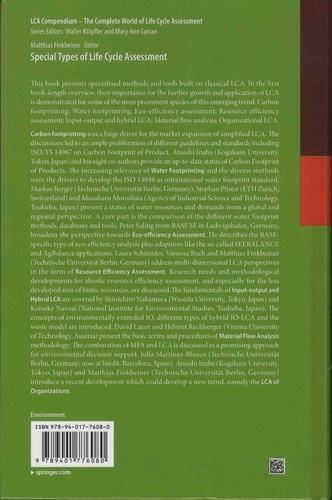En cours de chargement...
This book presents specialised methods and tools built on classical LCA. In the first book-length overview, their importance for the further growth and application of LCA is demonstrated for some of the most prominent species of this emerging trend : Carbon footprinting ; Water footprinting ; Eco-efficiency assessment ; Resource efficiency assessment ; Input-output and hybrid LCA ; Material flow analysis ; Organizational LCA.
Carbon footprinting was a huge driver for the market expansion of simplified LCA. The discussions led to an ample proliferation of different guidelines and standards including ISO/TS 14067 on Carbon Footprint of Product. Atsushi Inaba (Kogakuin University, Tokyo, Japan) and his eight co-authors provide an up-to-date status of Carbon Footprint of Products. The increasing relevance of Water Footprinting and the diverse methods were the drivers to develop the ISO 14046 as international water footprint standard.
Markus Berger (Technische Universität Berlin, Germany), Stephan Pfister (ETH Zurich, Switzerland) and Masaharu Motoshita (Agency of Industrial Science and Technology, Tsukuba, Japan) present a status of water resources and demands from a global and regional perspective. A core part is the comparison of the different water footprint methods, databases and tools. Peter Saling from BASF SE in Ludwigshafen, Germany, broadens the perspective towards Eco-efficiency Assessment.
He describes the BASF-specific type of eco-efficiency analysis plus adaptions like the so-called SEEBALANCE and AgBalance applications. Laura Schneider, Vanessa Bach and Matthias Finkbeiner (Technische Universität Berlin, Germany) address multi-dimensional LCA perspectives in the form of Resource Efficiency Assessment. Research needs and methodological developments for abiotic resource efficiency assessment, and especially for the less developed area of biotic resources, are discussed.The fundamentals of Input-output and Hybrid LCA are covered by Shinichiro Nakamura (Waseda University, Tokyo, Japan) and Keisuke Nansai (National Institute for Environmental Studies, Tsukuba, Japan).
The concepts of environmentally extended 10, different types of hybrid 10-LCA and the waste model are introduced. David Laner and Helmut Rechberger (Vienna University of Technology, Austria) present the basic terms and procedures of Material Flow Analysis methodology. The combination of MFA and LCA is discussed as a promising approach for envirOnmental decision support. Julia Martínez-Blanco (Technische Universität Berlin, Germany ; now at Inèdit, Barcelona, Spain), Atsushi Inaba (Kogakuin University, Tokyo, Japan) and Matthias Finkbeiner (Technische Universität Berlin, Germany) introduce a recent development which could develop a new trend, namely the LCA of Organizations.



